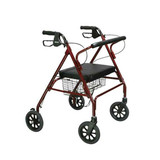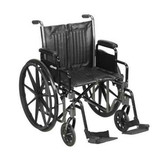
The Caregiver Guide - Defending Against Type 2 Diabetes
Diabetes has, over the last 30 to 40 years, become one of the most concerning health issues in the US. A study by the American Diabetes Association reveals some startling numbers for 2021:
· Diabetes was the eighth leading cause of death in the US
· 38.4 million people, or 11.6% of the population, had diabetes
· 8.7 million of these cases were undiagnosed
· A further 97.6 million Americans aged 18 or older had prediabetes
· The prevalence of diabetes among those 65 and older is 29.2%. This is 2.5 times higher than the national average of 11.6%.
We find two of these statistics particularly concerning. The first is the vast number of undiagnosed cases. Basically, 8.7 million people are unaware that they have a potentially life-threatening medical condition and may be compounding it by continuing with unhealthy habits.
The other concern is the 100 million-odd cases of prediabetes. This is a serious warning that an affected person’s blood sugar levels are abnormally high, and they run a substantial risk of developing full-blown type 2 diabetes down the line.
Know Thine Enemy
Know thine enemy and know thyself; in a hundred battles, you will never be in peril . Thus said Sun Tzu, an ancient Chinese military strategist who lived around 2,550 years ago. In the same vein, understanding diabetes and how it affects your body better equips you to put up an effective defense against it.
So, what, then, is diabetes? Your body runs on energy provided by sugar (glucose). Insulin, a hormone produced by the pancreas, manages how this glucose is used, making some available to the cells for energy and converting any surplus into fat to be stored for later use. In Type 2 diabetes, this process malfunctions, leading to a buildup of sugar in the bloodstream, with potentially serious long-term health risks.
Although some people may be genetically predisposed to Type 2 diabetes, lifestyle plays the most significant role. Being overweight, a lack of physical activity, and a diet high in processed or sugary food and drinks are major risk factors.
Very often, diabetes has no immediate or obvious symptoms. However, frequent urination, excessive thirst, unexplained weight loss and blurred vision are the most common signs that something is amiss. Don't ignore these warnings! Early diagnosis and intervention can make a huge difference in limiting long-term complications.
An Underrated Wrecking Ball
Untreated or poorly managed, Type 2 diabetes can inflict significant damage to long-term health prospects and overall quality of life. As with almost all health conditions, the severity of Type 2 diabetes symptoms depends largely on how well the condition is controlled. There are some effects, however, that many diabetics will experience, even if they’re managing their condition to some extent.
Kidney damage (nephropathy). This results from sustained high blood sugar levels and can eventually lead to kidney failure.
Nerve damage (neuropathy).This is also caused by high blood sugar and most commonly affects the hands or feet. Symptoms include numbness, tingling or burning sensations. The damage is irreversible.
Retinopathy:This is damage to the blood vessels in the retina, the light-sensitive part of the eye. It can lead to vision problems, including blindness.
Impaired circulation. High sugar levels damage the arteries and hinder circulation. This increases the risk of infection, especially in the feet and also significantly retards healing. Extreme cases can result in amputation of affected limbs.
The obvious central theme here is the potential effect of sustained high blood glucose levels. The good news is that these risks can be significantly reduced by maintaining glucose levels as close to normal as possible and avoiding wild fluctuations.
A Pillar of Support
The role of a caregiver is a tough one at the best of times. Likewise, living with diabetes is no walk in the park. Combine the two, however, and you may be up for some pretty special challenges. Look on the bright side, though. Your role as a caregiver can be empowering, and you can make a positive difference. Here are some useful strategies:
Educate yourself. The journey of a diabetic can sometimes feel very lonely. Episodes of diabetic ketoacidosis and hypoglycemia can trigger panic situations that are often insufficiently understood by family members. Learn as much as you can about Type 2 diabetes. Explore organizations like the American Diabetes Association (ADA) or the National Institute of Diabetes and Digestive and Kidney Diseases (NIDDK) . Being familiar with diabetes helps both you and your patient to avoid misunderstandings or arguments and to make better informed decisions together.
Optimize and harmonize. Work together on developing meal plans that are suitable for everyone in the household. Explore recipes that incorporate more diabetic-friendly ingredients like whole grains, fruits, vegetables, and lean protein while limiting processed foods and excessive carbohydrates. It’s important, however, for everyone to accept that it’s impossible to cater to everyone every time, and some dishes will just always be off-limits.
Encourage and empower. Maintaining independence plays an important role in an older person’s overall mental health. As a caregiver, your role is to offer guidance and support, remembering that your loved one or patient needs to feel that they’re in control. Encourage them to voice their concerns, ask questions freely and actively participate in decision-making.
Mind the Potholes
While caregiving is all about good intentions, there are a few things that can undermine your efforts and should be avoided as far as possible:
Don't nag or criticize. Mistakes happen! Use them as opportunities to address issues and solve problems in a calm and rational manner.
Don't take over. Avoid interfering in their self-care routines. Offer support whenever it’s needed, but let them take the lead in managing their day-to-day activities.
Don't expect the impossible. Change takes time. Developing healthy habits and managing a chronic condition is a journey, not a destination. Focus on long-term progress rather than the little bumps in the road.
Don't ignore their concerns. Listen attentively when they express frustration, fear, or any other emotions related to their diabetes. Acknowledge their feelings and offer support. Let them know they’re not alone.
To Sum it all Up
So, we have seen that Type 2 diabetes can be a very serious health concern. Sadly, it’s far too often misunderstood and underestimated. As a caregiver, you’re probably already dealing with one or more infirmities, and diabetes places a significant additional burden on that already tough task. At LL Medico, we understand these demands and the toll they can take.
We have almost 30 years of experience supporting caregivers and their patients. Save yourself the stress of managing your care supplies. Whether it’s adult diapers, nutritional supplements or over-the-counter medications, with LL Medico, you’ll never be caught short. Call us today at (855) 422-4556 or email [email protected] .



































































































































